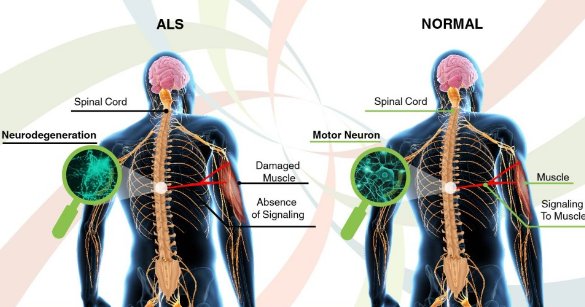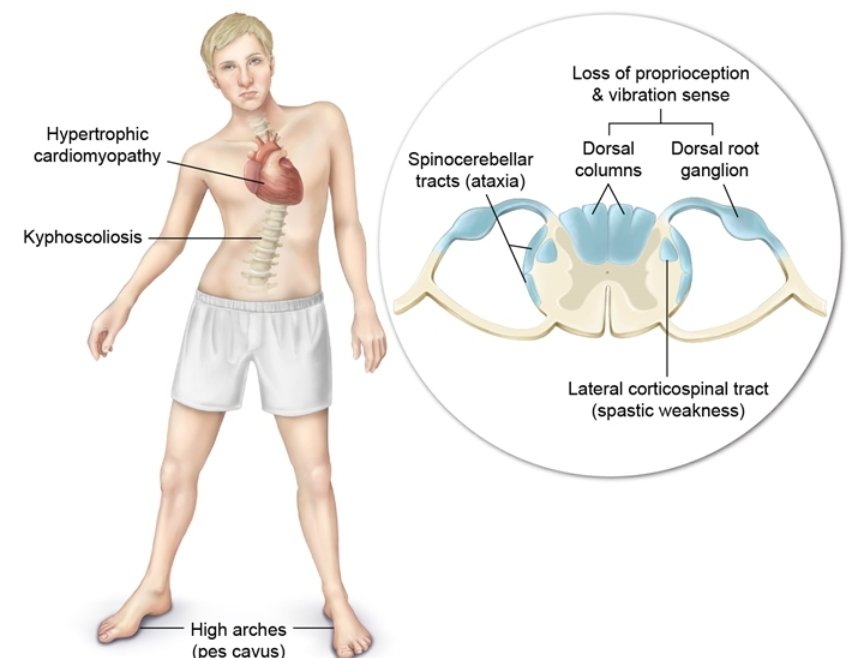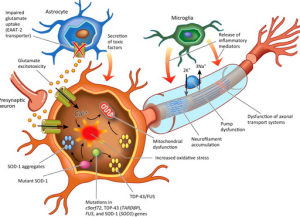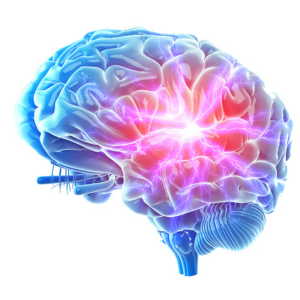Understanding Amyotrophic Lateral Sclerosis (ALS): Symptoms, Causes, and Treatment

Understanding ALS: Symptoms, Causes, and Treatment

Image by@twitter
Amyotrophic Lateral Sclerosis (ALS), also known as Lou Gehrig’s disease, is a progressive neurodegenerative disease that attacks nerve cells in the brain and spinal cord. These nerve cells, called motor neurons, are responsible for sending messages from the brain to the muscles that control movement. As the disease progresses, these motor neurons degenerate and die, leading to muscle weakness, atrophy (wasting away), and paralysis.
Early Signs of ALS
The early signs of ALS can be subtle and vary from person to person. Some of the most common early signs include:
- Muscle weakness in one hand or leg
- Slurred speech
- Difficulty swallowing
- Twitching or cramping of muscles (fasciculations)
- Balance problems
- Fatigue
These early signs can be easily mistaken for other conditions, so it’s important to see a doctor if you’re experiencing any of them.
Genetic Factors
ALS can be caused by genetic mutations, but in most cases, the cause is unknown (sporadic ALS). About 10% of ALS cases are familial, meaning they run in families. If you have a close relative with ALS, your risk of developing the disease is slightly increased. However, most people with ALS have no family history of the disease.
Researchers have identified a number of genes that are linked to ALS, but it’s likely that a combination of genetic and environmental factors contributes to the disease.
Also Read: Must Eat Raw Garlic
Managing ALS

Image by@twitter
While there’s no cure for ALS, there are treatment options and strategies to manage symptoms and improve quality of life. Let’s delve into these areas:
Treatment Options and Medications:
- Medications for Slowing Progression: A few FDA-approved medications can slow the progression of ALS:
- Riluzole: This is the first medication approved for ALS and shows some benefit in slowing nerve cell degeneration.
- Edaravone (Radicava): This medication may help slow the decline in daily function. It comes in intravenous and oral forms.
- Relyvrio (Sodium Phenylbutyrate/Taurursodiol): This recently approved medication also shows promise in slowing disease progression.
Medications for Symptom Management: Several medications can address specific symptoms like:
- Muscle cramps and stiffness: Baclofen, tizanidine, and mexiletine.
- Pain: Nonsteroidal anti-inflammatory drugs (NSAIDs) and opioids in severe cases.
- Sleep problems: Zolpidem or melatonin.
- Depression: Selective serotonin reuptake inhibitors (SSRIs) or other antidepressants.
- Respiratory Support: As ALS progresses, breathing difficulties may arise. Non-invasive ventilation (NIV) can provide breathing support at night or during the day. In severe cases, a tracheostomy with a ventilator might be necessary.
Nutritional Recommendations:
- Maintaining Calorie Intake: People with ALS often experience weight loss due to swallowing difficulties. A registered dietitian can recommend strategies to increase calorie intake, such as:
- High-calorie, nutrient-rich foods like avocados, nuts, and nut butter.
- Liquid nutritional supplements.
- Percutaneous endoscopic gastrostomy (PEG) tube feeding may be needed in advanced stages.
Exercise:
- Maintaining Muscle Strength and Function: Regular exercise, adapted based on your abilities, can help maintain muscle strength, flexibility, and range of motion. Options include:
- Physical therapy tailored to your condition.
- Gentle exercises like stretching, yoga, or swimming.
- Assistive devices like canes or walkers for mobility.
Additional Support:
- Occupational Therapy: An occupational therapist can help you adapt your daily activities and environment to maintain independence for as long as possible.
- Speech Language Pathology: A speech-language pathologist can help manage swallowing difficulties and develop communication strategies if speech becomes impaired.
- Respiratory Therapy: A respiratory therapist can teach you breathing techniques and provide support with respiratory equipment.
- Psychological Support: Living with ALS can be emotionally challenging. Counseling or support groups can help you cope with the emotional impact of the disease.
Remember, a multidisciplinary care team approach is crucial for managing ALS effectively. This team will work together to create a personalized plan to address your specific needs and improve your quality of life.
Also Read: Best Exercises for Toned Arms
Living with ALS
ALS presents a multitude of challenges, but there are ways to cope and access support to live as well as possible. Here’s a breakdown of some key areas:
Emotional Support:
- Individual therapy: Talking to a therapist can help you manage anxiety, depression, and other emotional struggles that may arise due to ALS.
- Support groups: Connecting with others who understand what you’re going through can be invaluable. The ALS Association has local chapters that offer support groups https://www.als.org/support/support-groups.
Maintaining a Positive Outlook:
- Focus on what you can control: While the disease is progressive, there are aspects you can control, like your daily routine, attitude, and activities you find meaningful.
- Practice relaxation techniques: Techniques like meditation, deep breathing, and mindfulness can help manage stress and anxiety.
Staying Connected:
- Social interaction: Maintaining social connections with friends and family is important for your emotional well-being.
- Technology can help: Utilize assistive technologies to stay connected, such as video calls, voice-activated devices, and social media.
Caregiver Support:
The Role of a Caregiver: Having a supportive caregiver is essential for managing ALS. Here are some tips to help the caregiver:
- Educate themselves about ALS: Understanding the disease progression and care needs will help them provide better support.
- Seek help: Caregivers often experience stress and burnout. Encourage them to seek support groups or counseling.
- Respite care: Arrange for temporary help to allow the caregiver time for themselves.
- The ALS Association: Provides resources and support programs for caregivers https://www.als.org/navigating-als/for-caregivers.
Disability Benefits and Palliative Care:
Financial Assistance: Several government programs offer financial aid to people with disabilities, including Social Security Disability Insurance (SSDI) and Medicare.
Palliative Care: This specialized medical care focuses on improving quality of life and managing symptoms, not necessarily curing the disease. It can be beneficial at any stage of ALS.
Remember: You’re not alone in this journey. There are resources and support systems available to help you manage ALS and live a fulfilling life as much as possible. Don’t hesitate to reach out for help from your healthcare team, the ALS Association, or other support groups.
Also Read: 6 Fitness Apps That Make Things Easier
Prognosis and Life Expectancy

Image by@twitter
Prognosis and Life Expectancy
ALS is a progressive disease, and the prognosis varies depending on individual factors. The average life expectancy after diagnosis is 3-5 years, but some people with ALS live for 10 years or longer. Early diagnosis and good management can significantly improve quality of life and potentially extend lifespan.
Research and Clinical Trials
There’s currently no cure for ALS, but extensive research is ongoing. Here are some promising areas:
- Identifying the Cause: Understanding the underlying causes of ALS is crucial for developing effective treatments.
- Neuroprotective Therapies: These therapies aim to protect nerve cells from degeneration.
- Gene Therapy: This approach holds promise for modifying genes linked to ALS.
- Stem Cell Research: Researchers are exploring the potential of stem cells to repair damaged nerve cells.
- Clinical trials are constantly testing new medications and therapies. You can find information about ALS clinical trials at https://clinicaltrials.gov/ct2/show/NCT00136500.
Support Groups:
Connecting with others who understand what you’re going through can be a source of strength and encouragement. The ALS Association has chapters across the US that offer support groups: https://www.als.org/
Also Read: Health Benefits of Zumba
Famous People with ALS:
Several famous people have shared their stories of living with ALS, raising awareness and inspiring others:
- Stephen Hawking: The renowned physicist defied the odds, living with ALS for over 55 years after diagnosis. His story exemplifies the potential for a full and productive life with ALS.
- Lou Gehrig: The baseball legend’s name became synonymous with ALS. His story brought public attention to the disease.
- Jason Becker: This talented guitarist continues to compose music despite his ALS diagnosis, demonstrating the power of resilience and creativity in the face of adversity.
These are just a few examples. Many others around the world live with ALS and share their stories of courage and hope.
How much did you like Our detailed Understanding Amyotrophic Lateral Sclerosis (ALS): Symptoms, Causes, and Treatment? Please share your view in the comment box. Also, please share these Blogs with your friends on social media.
Recommended
RELATED ARTICLES

Thoughts You Get When Not Loosing Weight

8 Food Items to Fight Winter Chills

5 common meditation mistakes to avoid


